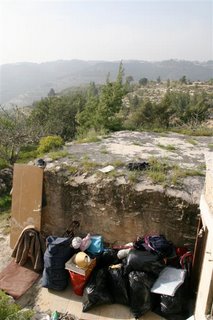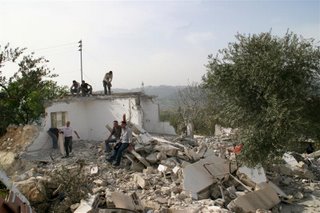The Israeli Raid in Jericho: The Background
Stephen Zunes - Wednesday, 22 March 2006, 01:51
The origins of the March 14 Israeli raid of a Palestinian prison in Jericho are rooted in another Israeli raid on a Palestinian city in 2001.
On August 27 of that year, Israeli occupation forces assaulted the offices of the Popular Front for the Liberation of Palestine (PFLP) with a U.S.-supplied helicopter gunship and missiles. Their target was PFLP leader Abu Ali Mustafa, who was killed instantly. The PFLP vowed to retaliate.
The PFLP, a Marxist movement notorious for engineering a spate of airline hijackings in the early 1970s, had in previous years ended its involvement in international terrorism and had returned from exile to emerge as part of the secular leftist opposition to both the Fatah-dominated Palestine Authority and the Islamist Hamas. As a legal political party, the PFLP regularly put forward candidates in Palestinian elections, though their percentage of the popular vote rarely scored better than the low single digits. The PFLP also maintained an armed militia, though--unlike Hamas and Islamic Jihad--it primarily targeted the Israeli military and police in the occupied territories rather than civilians inside Israel.
Seven weeks after the Israeli assassination of their leader, a PFLP militant assassinated Rehavam Zeevi, head of the far-right Moledet Party, who had been serving as Israeli Tourism Minister in Prime Minister Ariel Sharon's coalition government. The Moledet Party--which subsequently merged with other far right parties to form the National Union--is even more extremist in ideology than the PFLP, calling for the ethnic cleansing of all Palestinians from Israel and the occupied territories.
In response to Mustafa's murder, the State Department issued only a mild statement reiterating its opposition to Israel's assassination policy. In subsequent months, the Bush administration--with the encouragement of both Republican and Democratic congressional leaders--dropped even this nominal opposition and began to openly defend assassinations by Israeli death squads of suspected Palestinian militants. By contrast, President Bush personally condemned Zeevi's murder, criticized the Palestinian Authority's failure to jail the suspected assassins and PFLP leaders, and demanded that they be punished.
When Israel violently re-occupied Ramallah four months later and launched a six-week siege on Palestinian President Yasir Arafat's offices, President Bush expressed his understanding for the Israeli action--otherwise universally condemned in the international community--on the grounds that the suspected PFLP assassin and three alleged accomplices had sought refuge there. Bush noted how "these people are accused of killing a cabinet official of the Israel government. I can understand why the prime minister wants them brought to justice." He added, "They should be brought to justice if they killed this man in cold blood."
By contrast, there were no American demands to bring to justice the Israeli helicopter pilots or Israeli political and military leaders who were responsible for Mustafa's assassination. Similarly, there was no U.S. criticism of the 1988 Israeli assassination of a member of Arafat's cabinet, Defense Minister Khalid al-Wazir in Tunisia, much less a demand that those responsible for his murder be brought to justice. (An investigation by the Israeli newspaper Maariv revealed that the leader of the seaborne command center who oversaw al-Wazir's murder was Israel's then-deputy military chief Ehud Barak, who would later become Israeli prime minister, widely praised by President Bill Clinton and others as a great peacemaker.)
Arafat finally agreed to have the four PFLP militants implicated in the assassination jailed in return for the Israelis lifting the siege, along with Ahmed Saadat -- Mustafa's successor as PFLP leader -- even though the Palestinian judiciary cleared him of involvement.
Arafat was also forced to agree to imprison a sixth man, Palestinian Authority finance chief Fuad Shubaki, for attempting to smuggle arms from Iran. The U.S. position has been that while it is legitimate for the United States to send arms to the Israeli government to facilitate their occupation of Palestinian territory seized by Israel in the 1967 war, it is illegitimate for the Palestinians to import arms to resist the occupation.
Though the Bush administration had rejected calls from the Palestinians to dispatch U.S. peacekeeping forces to the West Bank to separate the two sides and protect civilian populations, President Bush--not trusting the Palestinian Authority to keep the six men incarcerated--insisted that American servicemen, later joined by British servicemen, be sent into the West Bank city of Jericho to help guard the prisoners.
While U.S. and British officials had complained in recent weeks of a deteriorating security climate, they did not give Palestinian officials any notice of their sudden departure on March 14. They did, however, apparently inform Israeli officials. Though there was no evidence to suggest that the departure of the foreign prison guards would lead to an imminent release of the six men, Israeli forces moved into Jericho and assaulted the prison, killing two guards and wounding two dozen others, kidnapping the six prisoners and bringing them to Israel.
The widespread Palestinian anger in response to the Israeli attack and kidnappings went well beyond those who support the PFLP's ideology or its retaliatory assassination of Zeevi. This latest violation of Palestine's limited sovereignty, with the apparent collusion of the United States--the supposed guarantor of the Oslo peace process and the detention agreement--and Great Britain deepens the sense of humiliation from the nearly 29 years of U.S.-backed Israeli occupation of the West Bank. It has weakened moderate Palestinian leaders like President Mahmoud Abbas, who has argued that the U.S.-brokered peace process offers hope for the establishment of a viable Palestinian state alongside Israel, while strengthening Hamas and other extremists who reject the peace process and Israel's very right to exist.
-Stephen Zunes is the Middle East editor of Foreign Policy In Focus (www.fpif.org) where this article first appeared. He is a professor of Politics and is the author of Tinderbox: U.S. Middle East Policy and the Roots of Terrorism (Common Courage Press, 2003.) © Foreign Policy in Focus















